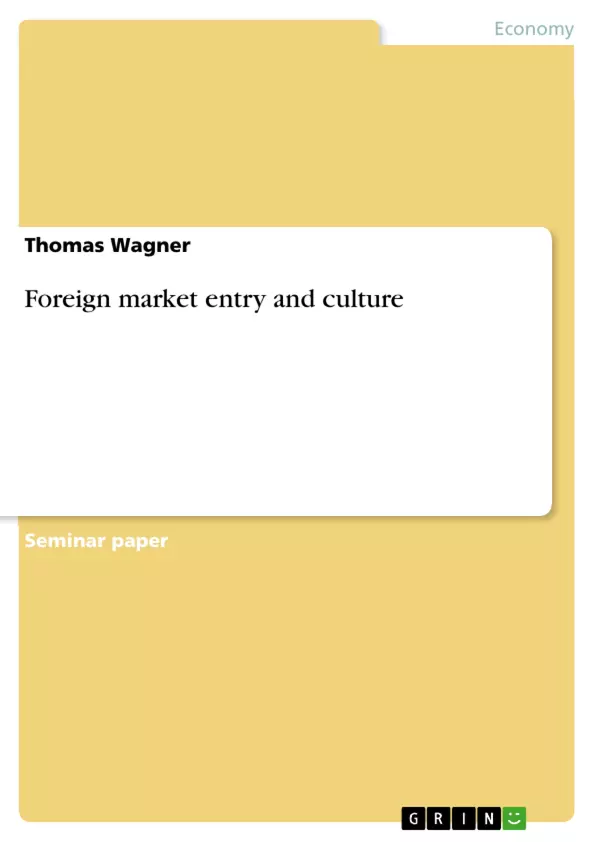Going abroad is nowadays much more easy due to the continuous globalization process with lower transportation costs and immediate information exchange. Especially during the last decades firms have increasingly committed themselves to global markets in order to exploit cost advantages through lower labour costs or in order to follow the demand for their products (Barkema et al. 1996:164). A firm seeking to perform in a foreign market by establishing a business function (e.g. production management, distribution) has to choose the best mode of entry which is very relevant for the success of foreign operations and therefor an important issue. But foreign market entry does not come along without any costs especialy in cultural distant countries. The impact of differences in national culture, measured as cultural distance between the home country of Multinational Enterprises (MNEs) and the country of operation is a very important issue and therefor worth to examine.
The main questions the paper tries to answer is: In which ways does culture matter in the internationalization process of a firm? How does culture affect the choice of market entry and which problems arise due to cultural differneces? Which impediments regarding culture have firms to deal with when going to China?
Inhaltsverzeichnis (Table of Contents)
- Introduction
- Structure of the paper
- Definition of culture
- Layers of culture
- Internationalization process and the role of culture
- Entry modes
- Factors influencing the entry mode decision
- Entry modes and culture
- Culture`s impact on market entry
- The learning perspective
- Negotiating styles
- Market entry in China – the case of German firms
- General facts
- Cultural differences
- Problems when negotiating with the Chinese
- Obstacles for market entry
- German firms in China – what ist the preferred entry mode?
- Conclusion
Zielsetzung und Themenschwerpunkte (Objectives and Key Themes)
This paper aims to investigate the role of culture in the internationalization process of firms, specifically how cultural differences affect the choice of market entry mode and the potential challenges that arise. The paper also examines the case of German firms entering the Chinese market, highlighting the cultural barriers and negotiation complexities associated with this specific market entry.
- The influence of culture on market entry strategies
- Cultural differences as a factor in entry mode decision-making
- Challenges and obstacles associated with cultural distance in internationalization
- Analysis of cultural differences between Germany and China
- Negotiation styles and their impact on market entry success
Zusammenfassung der Kapitel (Chapter Summaries)
The paper begins by defining culture and highlighting its various layers, emphasizing the impact of national culture on market entry. It then explores the internationalization process and the role of culture in shaping entry mode decisions. The paper discusses various entry modes, factors influencing their selection, and how cultural differences influence the effectiveness of each mode. It also examines the learning perspective, suggesting that companies can gain insights into cultural nuances through experience and adaptation.
The paper then delves into the specific case of German firms entering the Chinese market. It presents general facts about China, analyzes cultural differences using Hofstede's cultural dimensions, and discusses the obstacles and negotiation challenges faced by German firms. The chapter concludes by exploring the preferred entry modes for German firms in China.
Schlüsselwörter (Keywords)
Key concepts explored in this paper include internationalization, market entry strategies, cultural distance, entry modes, negotiation styles, cultural differences, German firms, China, Hofstede's cultural dimensions, and challenges and obstacles in market entry.
Frequently Asked Questions
How does culture influence the choice of foreign market entry mode?
Cultural differences, or cultural distance, significantly impact entry mode decisions. Firms must choose strategies (like joint ventures or wholly owned subsidiaries) that mitigate the risks and costs associated with operating in an unfamiliar cultural environment.
What are the main layers of culture according to the paper?
The paper defines culture and explores its various layers, emphasizing how national culture specifically affects business functions like distribution and production management abroad.
What specific challenges do German firms face when entering the Chinese market?
German firms often struggle with significant cultural differences, complex negotiation styles, and various institutional obstacles unique to the Chinese business landscape.
How does Hofstede's model apply to internationalization?
The paper uses Hofstede's cultural dimensions to analyze the differences between Germany and China, helping to explain why certain negotiation styles and entry modes are preferred or more successful.
What is the "learning perspective" in international business?
The learning perspective suggests that as firms gain experience in foreign markets, they adapt to cultural nuances, which can lead to more effective decision-making and better selection of entry modes over time.
- Quote paper
- Thomas Wagner (Author), 2008, Foreign market entry and culture, Munich, GRIN Verlag, https://www.grin.com/document/126904



